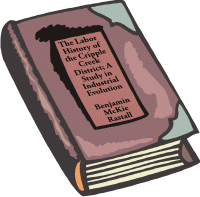 |
Victor
|
The Labor History of the Cripple Creek District;
A Study in Industrial Evolution
by Benjamin McKie Rastall

pages 158-160
The "Red Book" — The "Green Book."
INDICTMENT OF WESTERN FEDERATION BY MINE OWNERS' |
INDICTMENT OF MINE OWNERS' ASSOCIATION BY WESTERN FEDERATION |
| (1.) That a large number of criminals and lawless men have been welcomed, supported and sheltered by the Western Federation of Miners. | (1.) That a large number of ex-convicts, gamblers, desperadoes and other criminals have been and now are, knowingly employed and paid by the Colorado Mine Operators' Association and the citizens' alliance in Cripple Creek, Telluride and elsewhere in the state as deputy sheriffs, guards, detectives, etc. |
| (2.) That the officers of that organization and a large number of the members, while perhaps not committing crimes themselves for which they can be prosecuted, do directly and indirectly advise or encourage the lawless among them to commit crimes. | (2.) That the officers of these organizations and a large number of their members have not only committed crimes themselves, for which they could and should be prosecuted and punished, but the organizations as such, have directly and openly aided and abetted tne same, and their members have boasted and approved of such crimes. |
| (3.) That these officers and this element preach disrespect for the law and contempt for the lawful authorities and openly and publicly, as individuals, approve of and gloat over the slugging, dynamiting and murdering of non-union men by their criminal associates. | (3.) That the association and alliance, while shouting hypocritically for "law and order," have openly defied the courts, destroyed the liberty of the press, invaded the sanctity of the home, caused arrests without warrant, imprisoned men without charges of crime, driven men from the county after first robbing them, and while declaring such men to be criminals of the deepest dye, have, without compunction, dumped them on neighboring communities. |
| (4.) That where this organization has had its members in local public offices, or where It has had the power to influence peace officers and courts in this state, it has paralyzed the hand of justice and made It next to impossible to convict members of the federation caught In the act of committing crimes. | (4.) That wherever the association or alliance have not had their members in public office, they have, whenever deemed necessary, compelled by violence and intimidation, the resignation of duly elected public officials and the appointment of their own creatures to the so-called vacancies. Wherever their members or tools are in office, or where they have had the power to influence peace officers and courts in this state, the law, as established since Magna Charta, has been subverted by decisions which have made the state subject of derision to the entire country, the hand of justice has been paralyzed, and it has been futile to attempt conviction of their members, although caught in the act of committing crime and openly confessing and boasting it. |
| (5.) That this organization, having formally and officially espoused the cause of the so-called Socialist party, is opposed to our present form of government and is aiming at its overthrow, together with the abrogation of the present constitution. | (5.) That these organizations h,ave formally and officially espoused the cause of the so-called Republican party, which they pretend to be still the party of Lincoln. That each of them is opposed to our present form of government, and aiming at its overthrow. To this end they have destroyed and confiscated property, destroyed the freedom of the press, defied the courts, nullified the writ of habeas corpus, exercised the right of search without warrant, denied the right of trial by jury, exercised the power of banishment, denied the right of citizens to keep and bear arms, and trampled upon every other guarantee of personal liberty made by the constitution of the state and of the United States. |
|
(6.) That this organization teaches its members to regard the wealth they produce from the property of others as their own, thus encouraging theft (of ore, for instance) and also Inflaming the minds of Its members against their employers, against the law, against organized society and against the peace and safety of the public. |
(6.) That the organizations mentioned teach their members that the sole aim and end of existence is to acquire wealth without producing It, and that therefore the methods of trusts, stock watering, stealing ore from neighbors under the guise of trespass, and other similar methods used by predatory wealth, are respectable, when compared to the economic theory that wealth should belong to him who produces it. |
NEXT: The first natural, the second artificial — Frontier conditions vs. complete industrial development — Contrasts in the use of state authority — Civil and military authority — Politics — Minority rule